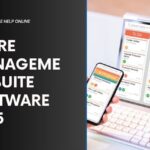It is not easy to run a dental laboratory. One aspect is taking orders and keeping them, scheduling and working with dentists, and so much more and the system becomes too much to bear with. Enter dental laboratory management software. This helps simplify the laboratory functions, and efficient coordination of the processes, and enables management of all the facilities and processes from a single point.
In this article, we will learn what is dental lab management software, its functions, and how it will improve your laboratory operations.
Table of Contents
What is Dental Laboratory Management Software?
Dental laboratory management software is a tool that allows better coordination of a dental lab, in this case, the lab to be managed is virtual. It assimilates the most critical processes involved in the operation of the laboratory management system which includes tracking of cases, schedules, payments, contacts, and audits.
Regardless if you have a small laboratory or a big one, employing a vam management software is essential in terms of time, efficiency, accuracy, and customer satisfaction benefits.
Key Features of Dental Laboratory Management Software
Now let’s examine the everyday components of dental office software and each purpose of the component relevant to the dental clinic.
1. Order and Case Management
This is pretty important since it provides the capability to control all types of incoming orders and dental cases. With this, you can:
- Provide all information about a specific case from the beginning up to downtown.
- Keep track of production stages such as modeling, scanning, and final quality control.
- Easily respond to changes or additional requirements from the dentists.
Don’t miss: 5 Best Long Video To Short Video Converter AI Tools
A digital workflow means reduced paperwork, elimination of mistakes, and enhanced visibility into the state of any laboratory at that particular point in time.
2. Scheduling and Production Tracking
Timelines are a very serious matter in the area of dental labs which all the employees can relate to. The software helps you:
- Prioritize the cases and allocate resources to the cases.
- Maximize the use of staff schedules to meet deadlines.
- Measure how much time every task takes, providing useful production information.
While scheduling solutions improve performance by eliminating unnecessary schedule changes, the work process is even furthered by improving internal delays.
3. Inventory and Supply Management
It is also important to note that managing inventory is another essential aspect of running a dental laboratory. This feature will help you:
- Monitor material consumption and stocks on hand.
- Create a trigger for reordering whenever stocks fall below a set point.
- Do not risk running out of stock for important stocks or accumulating too much of those that are necessary.
When inventory is managed accordingly, unnecessary unwanted costs can be eliminated while ensuring that it is always possible to have what is required for production.
4. Communication Tools
Establishing efficient channels of communication between the dental practices and the dental labs is crucial in assisting the delivery of quality service. The software in question usually enables:
- Interaction with dentists and clients in real-time.
- A client interface that allows orders to be placed for dentists and subsequent tracking of the orders.
- Uploading of case progress, queries, images, and more to lessen the chances of mistakes made from miscommunication.
Don’t miss: 10 Free Best AI Tools For Teachers 2024
This communication improvement ensures that the labs deliver work as expected by the clients within the deadlines.
5. Billing and Invoicing
A billing and invoicing process that is purely manual is usually tedious and fraught with mistakes. With billing features, you can:
- Send invoices automatically according to the orders captured.
- Monitor the payments made, the amounts outstanding, and the history of payments.
- Create and print out various accounting reports that reflect the operation of the lab.
This ensures that you are always in control of all the decisions relating to the money in the company which is useful in making sure that payment happens in time to improve cash flow.
6. Digital File Management
Currently, several dental laboratories utilize the use of digital impressions together with CAD/CAM procedures. The dental lab management software allows the user to:
- Organize and store all digital files inclusive of 3D scans, impressions, and designs – Not applicable.
- Work in conjunction with CAD/CAM systems to facilitate the transfer of data.
- Safeguard delicate information of clients.
Don’t miss: What is EMV Software | 5 Best EMV Software For 2024
By having all of your files contained in one place, you will be able to get to what is required rather quickly, and this will minimize the possibility of misplacement or loss of data.
7. Control of Quality
Every dental lab must adhere to the guidelines for quality. The application can help you:
- Introduce control of quality going through processes.
- Enumerate errors, remakes, and adjustments to improve.
- Verify that all details of a case or project are up to the standard of your lab before submitting it on delivery.
By managing and improving the quality, the chances of absorbing expensive remakes are less and the relationship with the customers is kept intact.
8. Reporting and Analytics
At last, the technical material is followed up with the section where deep analysis is performed as well as reporting on your lab. These reports include:
Efficiency of production: How long does it take to finish cases and bottlenecks that lie in between?
Source of financial data: Invoicing and monitoring of payments and incidences of outflows of funds.
Customer activity: Analysis of who are the most active clients, and who are the under-performing clients.
Don’t miss: 10 Best Free Reporting Tools For SQL In 2024
With these insights, you can use profits effectively for the expansion of the lab that you are managing.
Benefits of using Dental Laboratory Management Software
There are numerous advantages to moving to dental laboratory management software and in this section, these emergency changes will be highlighted:
Enhanced Efficiency: Manual activity such as scheduling, billing, order tracking, and so on when automated saves time which can be used for other productive activities.
Reduced Errors: The tendency to miscommunicate, to overlook orders, and to miss deadlines greatly drops in a centralized system.
Better Communication: The use of real-time communication tools and clients enables you to interlink with the dentists’ offices and to deliver the cases with accuracy.
Cost Savings: Labs can slash costs on more materials and production costs through improvement of the inventory system as well as minimizing the number of remakes.
Improved Quality: Quality assurance features enhance confidence that all the cases will meet the quality requirements of the lab before they are shipped.
Data-Driven Decisions: Reporting tools give the necessary analytics for you to be able to enhance production processes as well as the business as a whole.
Choosing the Right Dental Lab Management Software
All of the dental labs will not be the same; therefore, the software solution should be chosen in a way that addresses the particular desktop that you want in your lab. So here are the tips on how to find the right one for them:
Identify Your Needs: Do you need better case tracking? Do you want enhanced billing? Ensure that the system being procured possesses such very core features.
Check for Integrations: If other tools such as CAD/CAM systems and accounting software have been used, the new system should be incorporated within those very tools.
Ease of Use: Clear navigation should be essential, the software should be self-explanatory to a reasonable degree and not much training is desired.
Customer Support: Strong customer support helps customers in setting up and troubleshooting the purchased software.
Popular Dental Lab Software
As there may be so many options, below are some of the most common forms of dental lab software used:
EasyRx: User-friendly as its name suggests, EasyRx provides prescription and case management features and uses other 3D printer technologies.
Labtrac: A solid and powerful system that allows real-time order, materials, and stages of production planning and tracking.
MagicTouch: Works on enhancing workflow systems and automating the scheduling of production works for efficiency.
Dentsys: An ALL-IN-ONE solution that encompasses services ranging from Billing to Case Management and Reporting off CLI in all Lab Management.
Conclusion
Software for dental laboratory management is very useful to all labs irrespective of their size. It speeds up manual processes, enhances interactions with the clients, and gives strategies on how to manage the lab effectively to provide better services and improve the business.
If you want to make your processes easier, own the people responsible for errors, or want to transform the way your lab produces, dental lab management software has everything you require.





